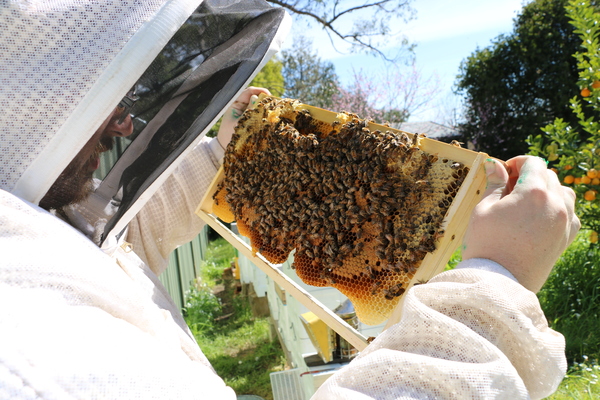
By Rowan Forster
A Pakenham apiarist has expressed his anguish over a spate of urban hive poisonings, killing tens of thousands of bees.
Lee Martland, from Lee’s Bees and Honey, says nests are being sprayed with pesticide – devastating the already struggling bee population.
While the insects can cause a minor inconvenience, Mr Martland said they can be easily relocated.
“They aren’t pests and they shouldn’t be treated as such,” he said.
“It really upsets me because I know how simple it is to relocate them.
“People kill swarms outside their house that are going to keep moving – thousands of bees.
“They’re easy, they’re quick and they don’t cost anything to relocate and a beekeeper shouldn’t even ask for money to do so.”
From Mr Martland’s experiences, big corporations are the worst culprits.
“It’s unfortunate that it comes down to a financial thing,” he said.
“The councils and electricity companies just poison them because they don’t want to pay the money to relocate them.”
Beekeepers are reportedly enthusiastic to undertake re-locations, even profiting from unpaid jobs they undertake.
Mr Martland said he takes relocated hives to his property, using them to produce and sell honey.
“You’ve got a colony of bees which in the next six months may make 40kg of honey,” he said.
“Yet you still have people poisoning them.”
Local resident Jahna Nile claims she discovered thousands of dead bees beneath the nest near her property on Winneke Way.
“It was shocking to see,” she said.
“There were thousands just lying dead, some of them were still dying as well.
“I can’t believe anybody would do that.
“Surely everybody knows by now how valuable they are to our environment.”
Since 2013, bee populations in some parts of the world have fallen by a third, with phenomena ranging from the spread of the varroa mite to climate change.
Many scientists believe if bees were to disappear from the face of the earth, humans would have just four years left to live.
Amateur Beekeepers Association’s Nathan Organ believes the best thing residents can do to support bee populations is to limit their use of insecticides.
“The suburbs are a great place for bees, and that’s where backyard gardeners are important, in terms of their use of pesticides and that sort of stuff,” he said.
“If our urban gardens are pesticide free, then our urban honey will have fewer pesticides in it.”







